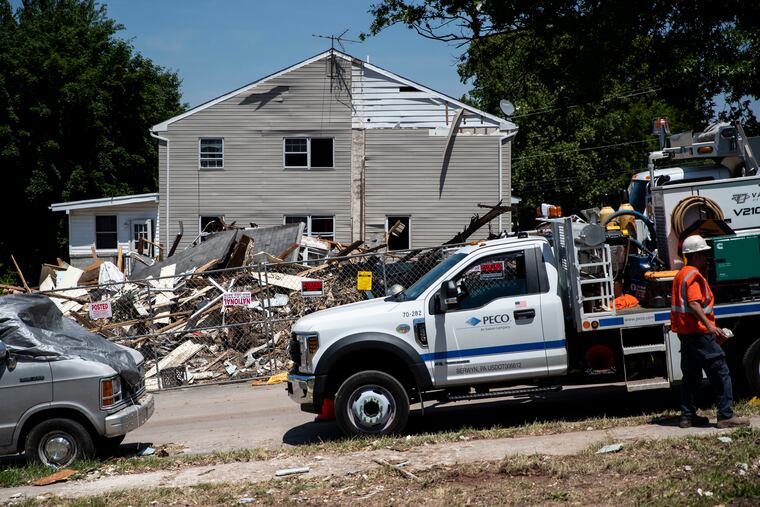Peco says there’s no evidence that gas from its system caused deadly Pottstown home explosion
The utility said a chemical analysis of residues did not implicate natural gas from its system. Meanwhile, Pottstown officials continue to investigate and assess structural integrity of nearby homes.

Days after a massive explosion obliterated two homes in Pottstown, killing four children and an adult, a cause has not yet been released, but Peco Energy says it has found no evidence that natural gas from its system caused the fatal blast.
A chemical analysis of residues from the explosion did not implicate natural gas from Peco’s system, said Mayra H. Bergman, Peco’s spokesperson. Peco previously said that neither the occupied house on Hale Street where the explosion is believed to have occurred nor a vacant adjoining twin house that was destroyed was connected to Peco’s natural gas mains.
“Our investigation continues and to date we have not found evidence that Peco’s natural gas caused this incident,” said Bergman. The company declined to speculate on what might have caused the blast, deferring that question to investigators.
The probe into the explosion remains ongoing, with Pottstown’s licensing and inspections department and fire department surveying damage to the area Wednesday. Pottstown officials provided no updates on the investigation.
» READ MORE: What we know and don’t know about the Pottstown explosion that killed 4 children and 1 adult
The statements from Peco follow days of speculation as to the cause and origin point of the explosion, which destroyed the two homes and damaged at least six other houses. Peco crews have been working in the street around the blast site as part of the investigation, Bergman said, though the utility crews were no longer at the scene Wednesday.
A relatively unscathed propane tank seen at the site also caused speculation that it could have set off the blast.
Photographs of the residence before and after the explosion show what appears to be a 120-gallon vertical propane tank outside the rear of the house. Customers usually get liquid propane delivered by truck from a dealer. Propane distributor AmeriGas confirmed one of its tanks was at the home, and said it was cooperating with the investigation. When propane is released from a pressurized tank, it becomes a flammable gas.
Natural gas is mostly composed of methane, which is chemically different from propane. Tests will likely be able to detect the material that was involved in the explosion.
Neighbors described a thundering boom around 8 p.m. last Thursday and said it felt as if a bomb had gone off. The explosion blew debris as far as a block away and blanketed the neighborhood with insulation material.
Francine White, 67; Alana Wood, 13; Jeremiah White, 12; Nehemiah White, 10; and Tristan White, 8, were killed, Pottstown police said. Eugene White, 44, and Kristina Matuzsan, 32 — who were married — were injured and were in critical condition.
» READ MORE: The Pottstown family that lost 5 members in a house explosion relocated from Philly for a better life
On Friday, at least four neighbors — including former residents of the adjoining twin unit of the house that exploded — told The Inquirer that they had persistently smelled gas in the area as far back as 2007 and as recently as a few months ago. Neighbors said that they would call Peco about the smell, but workers would leave without detecting anything.
Peco said that under Pennsylvania Public Utility Commission regulations, the company is obligated to respond to all calls about gas leaks within an hour, and that the company complies 99.9% of the time. In the few instances where it does not respond in under an hour, it is required to report the lapse to the commission.
Peco provides natural gas service by underground gas mains to Pottstown. There is a dead-end Peco gas main stub in the neighborhood with no current customers, and neither side of the twin home was connected to Peco’s natural gas service, Bergman said.
Propane and fuel oil distributors often deliver fuel to customers, which is stored on site in tanks. The tanks may be owned by the energy companies and leased to the customers, or the tanks may be owned by the customers themselves.
Pottstown officials said their crews were conducting damage assessments on Wednesday to evaluate the structural integrity of homes near the explosion.
“We are concentrating on the immediate area surrounding the site. Once these properties have been inspected, the area will be expanded outward,” a statement from the borough read.
Jordan Strokovsky, a lawyer who represents residents of two homes close to the explosion, said there was more investigating to be done: “Our team of experts have not yet had the opportunity to inspect the scene, and this will be a very thorough investigation to hopefully ensure something like this never happens again.”